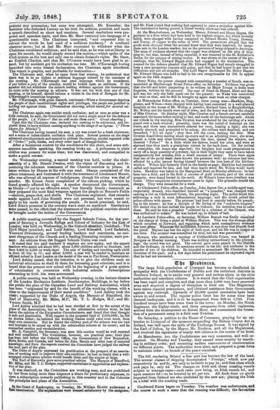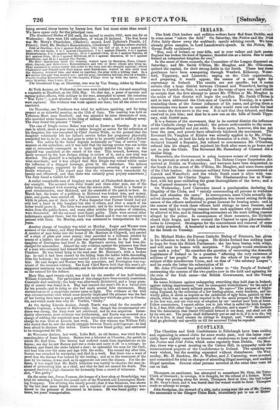'bt Vrobirtres.
The large Irish population of Liverpool has become so disaffected in sympathy with the Confederates of Dublin and the turbulent districts in Southern Ireland, as to excite very general and serious alarm in the civic authorities and merchant citizens. It is stated that the Club organization has been rapid and complete, and that more than 5,000 men have procured arms and acquired a degree of discipline in their use. The Magistracy have taken especial precautions, and obtained assistance from Government against any outbreak. Upwards of 20,000 special constables have been sworn in and armed. The regular police force has for some time been deemed inadequate, and it is to be augmented from 800 to 1,700. Five hundred troops have been some time in the town: on Monday, the Ninth Regiment, the Eighty-ninth, and three companies from other regiments, arrived from the encampment on Kersal Moor, and commenced the forma- tion of a permanent camp in a field near Everton.
On Saturday, a petition to the House of Commons, praying for an ex= tension to Liverpool of the measure suspending the Habeas Corpus Act in Ireland, was laid upon the table of the Exchange Rooms. It was signed by the Earl of Sefton, by the Mayor, Mr. Rushton, and all the Magistrates, and received the signatures of nearly 400 citizens in the course of an hour.
At Manchester, too, the Confederates are very numerous, and well or- ganized. On Monday and Tuesday, they caused some anxiety by march- ing in military order, and executing sudden manmuvres of concentration on different points. The authorities were alert, and prepared a great force to maintain order: no breach of the peace occurred.
The bill rendering Bristol a free port has become the law of the land. The several classes of shipping denominated " Foreign," which now pay respectively 3s. and 2s., are only to be liable to pay Is., and that class which now pays ls., only 6d. The charges on Irish and those coasting vessels subject to tonnage-rates—such rates now being, on Irish vessels 8d, and upon coasters 6d.—to be lowered to 4d. per ton. All dock-dues on goods imported from Ireland are also abolished by the new act; placing the Irish on a level with the coasting trade.
Goodwood Races began on Tuesday. The weather was unfortunate, and the course in such a state that the running was difficult; the favourites
being several times beaten by horses less fleet but more stout than usual. We have space only for the principal race.
The Goodwood Stakes of 251. each, the second to receive 100L, were run for on Wednesday: there were 123 subscribers, of whom 76 declared. The first horse was Mr. Merry's Chanticleer, (Marlow); second, Lord Eglinton's Plaudit, (J. Prince); third, Mr. Shelley's Remembrance, (Dockeray). Thirteen others started. Odds at Starting-3 to 1 against Reflection, who ran last of all, 6 to I against Pil- lage, who ran tenth, 6 to 1 against Chanticleer, 7 to 1 against Plaudit, 8 to 1 against Remembrance, 9 to 1 against Gayety, 20 to I against Chat, 25 to 1 against Tarella, 20 to 1 against Fern, 20 to 1 against Millwood, 20 to 1 against Sheraton, 25 to 1 against Halethorpe, and 33 to I against The Tartar.
The Race—Raistborpe made the running, waited upon by Sheraton, Fern, Chanti- cleer, Gayety, and Reflection ; Remembrance and two or three others also lying up. They remained in pretty nearly this order to the turn Into the straight running ; where Chanticleer and Plaudit took their places next Ralsthorpe, waited on him until near the distance, defeated him, and went on together, the gray with a trifling lead. In a Saw strides this pair was singled out ; and the gray, increasing his lead, won by a length ; Plaudit beating Remembrance by two lengths, Pillage close up with the latter. Dis- tance 2i miles; time 5 min. 37 sec.
The Goodwood Cup, on Thursday, was won by Van Tromp, ridden by Marlow.
At York Assizes, on Wednesday, ten men were indicted for a riot and assaulting a constable at Bradford, on the 29th May. On that day, a posse of specials and regular police-officers, with military in the rear, attempted to arrest the notorious " Wet Tyler "; a mob attacked the constables; a fight ensued; and the accused were captured. The evidence was weak against one man; but all the others were convicted.
On Thursday, one Tomlinson was tried for seditious speaking, and for being puent at an unlawful meeting, on the 12th of June. The meeting was held on Toftsham Moor, near Bradford; and was attended by some thousands of men, who marched under banners to the time of military music, and in military array. The Jury found the prisoner " Guilty."
The case of Dingle versus Baker was tried at Exeter on Tuesday. It is the case in which, about a year since, a father brought an action for the seduction of his daughter, but was nonsuited by Chief Justice Wilde, on the ground that the daughter voluntarily left her father's service before her pregnancy physically compelled her to do so: she had gone in order to be secretly confined at a distant town. The action by the father depends technically on " loss of service " con- sequent on the seduction; and it was held that the leaving service was not in this case so necessarily consequent as to have legally induced the injury: so the plaintiff was nonsuited at the outset of his case. This nonsuit, however, was lately reversed by the four Judges sitting in review of it, and a new trial was directed. The plaintiff is a turnpike-keeper at Dartmouth, and the defendant a wine-merchant; and it was alleged that Miss Dingle was ruined whilst under the influence of a drugged beverage, given by the defendant. The defence alleged conspiracy, supported by the unscrupulous swearing of a number of female witnesses. [The report says that the witnesses were remarkable for beauty and effrontery, and that there was certainly great perjury somewhere.] The Jury found a verdict for 201.
A rather remarkable case of burglary was tried at Chelmsford Assizes on Fri- day sennight. The accused were John Gould and three other men, one of the latter being charged with receiving what the others stole. Gould is a farmer in good circumstances, near Halstead, and the constable of the parish to boot. In March last, the house of a publican in Halstead was broken into, and money, plate, and goods, were carried off. Two labourers were arrested for the robbery; while in prison, one of them told a Police Inspector that Farmer Gould had not only had a hand in this burglary but also in others, and that a search of his house would prove it. The farm was searched; and in his house two liquor-jars stolen from the public-house, and many other articles the produce of robberies, were discovered. All the accused were found guilty. There were several other indictments against them; but the Lord Chief Baron said it was not necessary to proceed with them. On Monday, each was sentenced to transportation for ten years.
Another charge of burglary was tried on Monday. Jasper and Warner were accused of the robbery, and Mary Dorrington of concealing and abetting the crime. A number of men broke into the house of Mr. Harrison at Chigwell, and carried off a chest of plate and some money; they ascended to a bedroom window by means of a ladder; the chest of plate was afterwards found in the Forest. A. daughter of Dorrington had lived in Mr. Harrison's service, but had been dis- charged for misconduct. Almost the only evidence against the prisoners was that of a man who certainly had himself been one of the robbers. This was Thomas Cumbers. He was found lying in the road near Mr. Harrison's, with a broken leg: he said it had been caused by his falling from the ladder while descending from the bedroom: his companions carried him a little way, and then abandoned him. He said Jasper and Warner were his associates, and Dorrington was cog- Liz' ant of the intended robbery. The. Lord Chief Baron held that this man's un- mipported testimony was insufficient; and he directed an acquittal, without calling OR the counsel for the defence.
Mary May, aged twenty-eight, was tried for the murder of her half-brother, William Constable. The particulars of this charge have been recently mentioned. Constable died suddenly; the body was afterwards disinterred, and a large quan- tity of arsenic was found in it. May had insured the man's life in a burial-club for ten pounds; and in doing so she had made several false statements. Many circumstances of a suspicious nature came to light. The evidence at the trial was circumstantial; that which most directly implicated the prisoner was the fact of her having been seen to put a powder into some beer which she gave to Consta- ble, and which made him very ill. Verdict, "Guilty."
At the Spring Lincoln Assizes, Joseph Travis was tried for the murder of Charles Copeman, a farmer of Blyborough; but, though the circumstantial evi- dence was strong, the Jury were not convinced, and he was acquitted. Imme- diately afterwards' more evidence was forthcoming, and Travis was arrested on a charge of robbing the murdered man of four sovereigns and some silver. On this charge he was tried at Lincoln last week. The new witness was William Fell; who stated that he saw the deadly struggle between Travis and Copenaan: he had been afraid to disclose this before. Travis was now found guilty, and sentenced to be transported for life.
At Worcester Assizes, last week, Luke Bull, an old farmer, was tried for the manslaughter of Isaac Barnes. Barnes was a labourer at Chaceley, the parish in which Mr. Bull lives. The farmer had suffered much from depredations on his fences; one day he saw Barnes pull out a stake and carry it off to a cottage; he followed, and found the stake behind a door; he upbraided the man for the theft, and beat him over the arms and legs with the stake. The second day after this, Barnes was attacked by erysipelas, and died in a week. But there was a want of proof that the disease was caused by the beating ; and as to the treatment of the man by his nurses, it was such as to aggravate not care the disease. For the de- fence, it was urged that Mr. Bull's intention was merely to chastise the man in- stead of prosecuting him as a thief, and that he had not caused his death. The accused received a high character for humanity from a crowd of witnesses. Ver- dict, "Not guilty."
On the same day, James Pearson, the keeper of a beer-shop at Stourbridge, was tried for uttering a forged five-pound note of the Warwick and Leamington Bank- ing Company. The uttering was clearly proved; that it was felonious, was shown by the fact that more forged notes and a number of counterfeit sixpences were traced to the prisoner or discovered in his house. He was found guilty: sen- tence, ten years transportation.



























 Previous page
Previous page